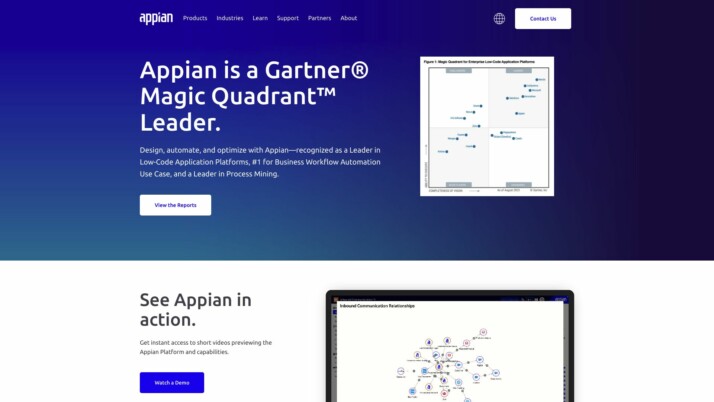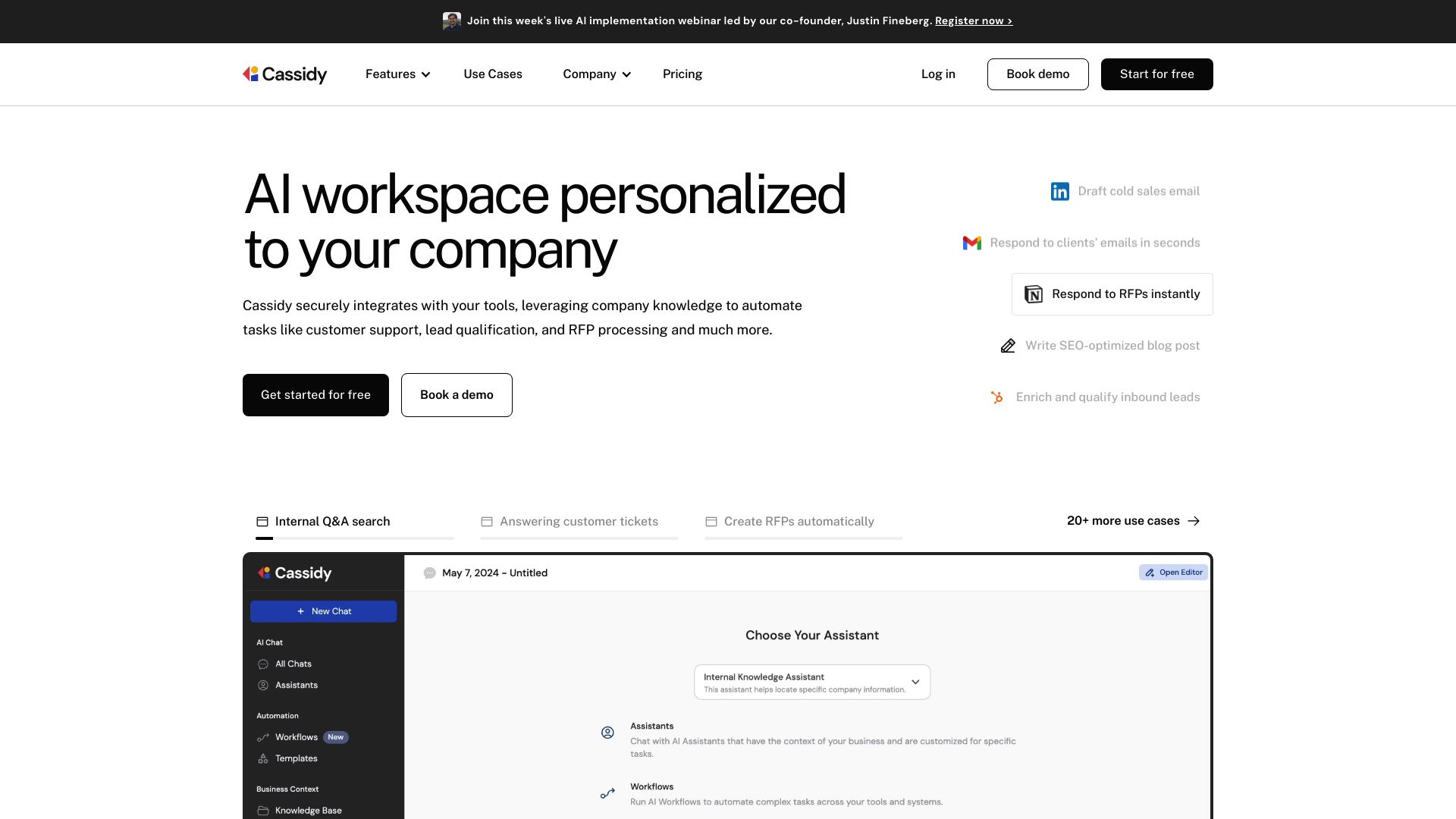Appian vs. Cassidy: AI-Powered Automation Compared
AI-powered platforms revolutionize business processes, offering unprecedented automation and efficiency. This comparison examines Appian vs. Cassidy, and SmythOS, three leading solutions in the AI automation space. Appian delivers low-code AI integration for enterprise-focused automation. Cassidy specializes in customizable AI assistants and user-friendly workflow automation.
SmythOS emerges as a comprehensive platform, combining powerful features with unmatched flexibility. We’ll explore each platform’s strengths, limitations, and unique selling points, helping you determine the best fit for your organization’s AI needs. Whether you’re a developer seeking advanced customization, a business leader focused on scalability and security, or a non-technical user looking for accessible AI tools, this analysis provides valuable insights to guide your decision-making process.
Appian Overview
Appian delivers a low-code platform for building AI-powered applications and workflows. The platform combines visual development tools with pre-built AI capabilities, enabling both technical and non-technical users to create intelligent solutions.


Appian’s AI offerings focus on enhancing business processes through document intelligence, email automation, and generative AI. The platform excels at integrating AI into existing workflows, allowing organizations to automate complex tasks like document classification, data extraction, and intelligent routing.
Appian’s AI offerings focus on enhancing business processes through document intelligence, email automation, and generative AI.
Key features include a visual AI Skill Designer for creating custom models, pre-built AI capabilities for common use cases, and an Enterprise Copilot for quick information retrieval. Appian prioritizes data privacy and security, ensuring AI models and data remain under user control. The platform also supports integration with external AI services like OpenAI for advanced natural language processing.
While Appian provides powerful tools for AI-enhanced process automation, it lacks some advanced features found in dedicated AI agent platforms. The system does not offer built-in support for autonomous agents, multi-agent collaboration, or advanced debugging tools for AI models. Additionally, Appian’s focus on business process automation may limit its applicability for users seeking more general-purpose AI development environments.
Appian integrates seamlessly with existing enterprise systems and supports deployment across development and production environments. The platform’s scalability and enterprise-grade security make it well-suited for large organizations looking to incorporate AI into their operations. However, smaller teams or individual developers might find the enterprise focus and associated costs challenging.
Cassidy Overview
Cassidy specializes in creating AI automations and assistants tailored to specific business needs. The platform securely integrates with existing tools, leveraging company knowledge to automate tasks like customer support, lead qualification, and RFP processing. This personalization enhances productivity by equipping AI assistants and workflows with full context specific to each business.
Cassidy specializes in creating AI automations and assistants tailored to specific business needs… enhancing productivity by equipping AI assistants and workflows with full context specific to each business.


Cassidy’s platform offers a model-agnostic approach, allowing users to leverage any foundational AI model. This flexibility future-proofs AI strategies and enables businesses to adapt to evolving technologies. The platform seamlessly integrates with various data sources, including Google Drive, Slack, and Notion, facilitating easy access to company knowledge and existing workflows.
Cassidy’s platform offers a model-agnostic approach… This flexibility future-proofs AI strategies and enables businesses to adapt to evolving technologies.
Security stands as a cornerstone of Cassidy’s offering. The platform ensures data confidentiality by never using client data for model training, addressing a critical concern for businesses handling sensitive information. This enterprise-grade security measure positions Cassidy as a trustworthy option for organizations prioritizing data protection.
The platform ensures data confidentiality by never using client data for model training, addressing a critical concern for businesses handling sensitive information.
Cassidy’s user-friendly workflow builder empowers non-technical users to create complex AI automations. The no-code, drag-and-drop interface simplifies the process of building AI-powered workflows, democratizing access to advanced AI capabilities. Additionally, Cassidy offers browser extensions, bringing AI capabilities directly into web applications like LinkedIn and email clients, enhancing productivity in everyday tasks.
While Cassidy offers robust features for AI automation and integration, it may face challenges in highly specialized or niche industry applications. The platform’s focus on accessibility and ease of use could potentially limit advanced customization options for users requiring intricate, domain-specific AI models. As with any AI platform, the effectiveness of Cassidy’s solutions depends heavily on the quality and relevance of the data provided by users.
Feature Comparison
Appian and Cassidy offer distinct approaches to AI-powered business process automation, with notable feature gaps in core components and security. Appian excels in low-code AI integration and enterprise-focused automation, while Cassidy emphasizes customizable AI assistants and workflow automation.
Appian provides robust document intelligence capabilities, including classification and data extraction from various file formats. Its AI Skill Designer allows custom model creation without extensive data science expertise. However, Appian lacks built-in support for autonomous agents and multi-agent collaboration, limiting its flexibility for complex AI ecosystems. Cassidy, conversely, offers a model-agnostic approach, enabling businesses to leverage any foundational AI model and adapt to evolving technologies.
In terms of security, Appian emphasizes data privacy and likely incorporates encryption practices, though specifics on IP control are not mentioned. Cassidy takes a strong stance on data confidentiality, explicitly stating that client data is never used for model training. This enterprise-grade security measure gives Cassidy an edge for businesses prioritizing data protection. However, SmythOS outperforms both platforms in security features, offering comprehensive options like constrained alignment, data encryption, OAuth, and IP control, providing users with unparalleled data and access security.
Feature Comparison Table
| Appian | Cassidy | SmythOS | |
|---|---|---|---|
| CORE FEATURES | |||
| Hosted Agents (Dev, Production) | ❌ | ✅ | ✅ |
| Autonomous Agents | ❌ | ❌ | ✅ |
| Explainability & Transparency | ✅ | ❌ | ✅ |
| Multimodal | ✅ | ❌ | ✅ |
| Multi-Agent Collaboration | ❌ | ❌ | ✅ |
| Audit Logs for Analytics | ✅ | ❌ | ✅ |
| Agent Work Scheduler | ❌ | ✅ | ✅ |
| SECURITY | |||
| IP Control | ✅ | ❌ | ✅ |
| COMPONENTS | |||
| Foundation AIs | ❌ | ✅ | ✅ |
| Huggingface AIs | ❌ | ❌ | ✅ |
| Zapier APIs | ❌ | ✅ | ✅ |
| Classifiers | ✅ | ❌ | ✅ |
| Data Lakes | ✅ | ❌ | ✅ |
| DEPLOYMENT OPTIONS (EMBODIMENTS) | |||
| Staging Domains | ✅ | ❌ | ✅ |
| Production Domains | ✅ | ❌ | ✅ |
| API Authentication (OAuth + Key) | ✅ | ❌ | ✅ |
| Deploy as Site Chat | ❌ | ❌ | ✅ |
| Deploy as Scheduled Agent | ❌ | ✅ | ✅ |
| Deploy as GPT | ❌ | ❌ | ✅ |
| DATA LAKE SUPPORT | |||
| Hosted Vector Database | ❌ | ❌ | ✅ |
| Sitemap Crawler | ❌ | ❌ | ✅ |
| YouTube Transcript Crawler | ❌ | ❌ | ✅ |
| URL Crawler | ❌ | ❌ | ✅ |
Best Alternative to Appian and Cassidy
SmythOS stands out as a superior alternative to Appian and Cassidy, offering a comprehensive platform for AI agent creation and deployment. Our solution combines powerful features with unparalleled ease of use, making it the ideal choice for businesses seeking to harness the full potential of AI automation.
Unlike Appian and Cassidy, SmythOS provides true autonomous agents capable of performing complex tasks independently. This breakthrough feature enables businesses to automate a wider range of processes, from customer service to data analysis, without constant human oversight. Our multi-agent collaboration capabilities further enhance this functionality, allowing AI agents to work together seamlessly on intricate projects.
SmythOS provides true autonomous agents capable of performing complex tasks independently… enabling businesses to automate a wider range of processes, from customer service to data analysis, without constant human oversight.
SmythOS excels in its extensive integration ecosystem, surpassing both Appian and Cassidy. We offer pre-built API integrations and templates for popular services like Slack, Trello, and GitHub, significantly reducing setup time and allowing users to focus on innovation. This versatility ensures that SmythOS can adapt to virtually any workflow or business process, providing a level of flexibility that our competitors simply can’t match.
Security is paramount in AI development, and SmythOS leads the pack with robust features like constrained alignment, data encryption, OAuth, and IP control. These advanced security measures provide users with unparalleled data protection and access security, addressing the critical concerns of data privacy and confidentiality that are often overlooked by other platforms.
With SmythOS, we’ve revolutionized the AI agent development process, making it 99% faster and more accessible than ever before. Our intuitive drag-and-drop interface, coupled with support for a vast array of AI models from different providers, empowers users of all skill levels to create sophisticated AI solutions. By choosing SmythOS, businesses can unleash an economic revolution, automating mundane tasks, improving efficiency, and driving innovation across their operations at an unprecedented scale.
Conclusion
Appian and Cassidy offer powerful AI-driven solutions for business process automation, each with unique strengths. Appian excels in low-code AI integration and enterprise-focused automation, while Cassidy emphasizes customizable AI assistants and user-friendly workflow automation. Both platforms provide valuable tools for businesses seeking to leverage AI in their operations.
However, SmythOS emerges as the superior choice, offering unparalleled flexibility, security, and ease of use. Our platform’s drag-and-drop interface, extensive integration ecosystem, and versatile deployment options make AI development accessible to users of all skill levels. SmythOS supports multi-agent collaboration and provides advanced features like constrained alignment and comprehensive security measures, addressing critical concerns for businesses handling sensitive data.
While Appian and Cassidy may suit specific use cases, SmythOS’s comprehensive feature set and model-agnostic approach position it as the ideal solution for businesses looking to fully harness the power of AI. Our platform not only matches the capabilities of Appian and Cassidy but surpasses them in key areas such as scalability, customization, and deployment flexibility.
Experience the future of AI-driven business solutions with SmythOS. Explore our diverse range of AI-powered agent templates to kickstart your journey, or create a free SmythOS account to build unlimited AI agents at no cost. Transform your workflow and unlock unprecedented levels of automation and efficiency with SmythOS – your gateway to the next generation of AI-powered productivity.
Last updated:
Disclaimer: The information presented in this article is for general informational purposes only and is provided as is. While we strive to keep the content up-to-date and accurate, we make no representations or warranties of any kind, express or implied, about the completeness, accuracy, reliability, suitability, or availability of the information contained in this article.
Any reliance you place on such information is strictly at your own risk. We reserve the right to make additions, deletions, or modifications to the contents of this article at any time without prior notice.
In no event will we be liable for any loss or damage including without limitation, indirect or consequential loss or damage, or any loss or damage whatsoever arising from loss of data, profits, or any other loss not specified herein arising out of, or in connection with, the use of this article.
Despite our best efforts, this article may contain oversights, errors, or omissions. If you notice any inaccuracies or have concerns about the content, please report them through our content feedback form. Your input helps us maintain the quality and reliability of our information.
